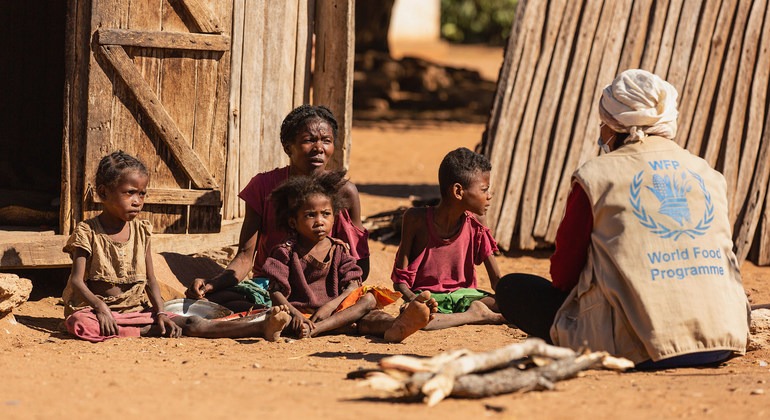
UN Warns Of An ‘Invisible Crisis’ In Madagascar
Thousands of people in Madagascar are having to live off locusts and wild leaves as climate change pushes communities close to starvation, aid agencies have warned.
At least half a million children under five years old are believed to be on the brink of acute malnourishment, the United Nations estimates.
Back-to-back droughts driven by climate change mean that more than a million people are going hungry, and of these 14,000 are already in “catastrophic conditions”, the UN World Food Programme (WFP) said. Crops have failed or been destroyed by sandstorms, and people are resorting to increasingly desperate measures to stay alive, including eating termites and tamarind seeds mixed with clay.
The UN describes the situation in southern Madagascar as an “invisible crisis”.
“What is currently happening in southern Madagascar is heartbreaking”, a WFP representative, Moumini Ouedraogo, said. “We cannot turn our backs on these children whose lives are at stake.”
The charity SEED is working in Madagascar. Its director, Mark Jacobs, said that, if more food support was not provided soon, there would be a repeat of the famine that swept across the island in the 1990s, which became known locally as the era of scattered skeletons.
He said: “SEED Madagascar is generally not a relief agency. We work on long-term programmes, supporting health, livelihoods and education to provide long-term resilience. Many factors, including Covid, drought, and rising rice prices, are combining this time to create the perfect storm. A short-term intervention, providing food, is absolutely necessary to save lives, until we can continue our efforts working on long-term sustainable development.”
The Christian disability charity CBM works through a partner in southern Madagascar to get food to the most vulnerable families, often those living with a disability who find it difficult to access aid.
Its director, Kirsty Smith, said: “People with disabilities are among the most vulnerable, and can often be unintentionally excluded from a humanitarian response, through not being able to access food distribution points or able to queue for hours. As people migrate in search of food, those with disabilities often get left behind.
“People in southern Madagascar have had the worst drought for 40 years, and families have been chronically hungry for years. People are pushed into desperate measures to survive, and all the usual safety nets get eroded as the crisis goes on.
“People are already dying — and, if the world continues to ignore this invisible crisis, many more will lose their lives.”
The director of the WFP, David Beasley, said that the crisis was caused entirely by climate change. “This is an area of the world that has contributed nothing to climate change, but now they’re the ones paying the highest price,” he said.
CBM and Seed have both launched appeals for Madagascar.

